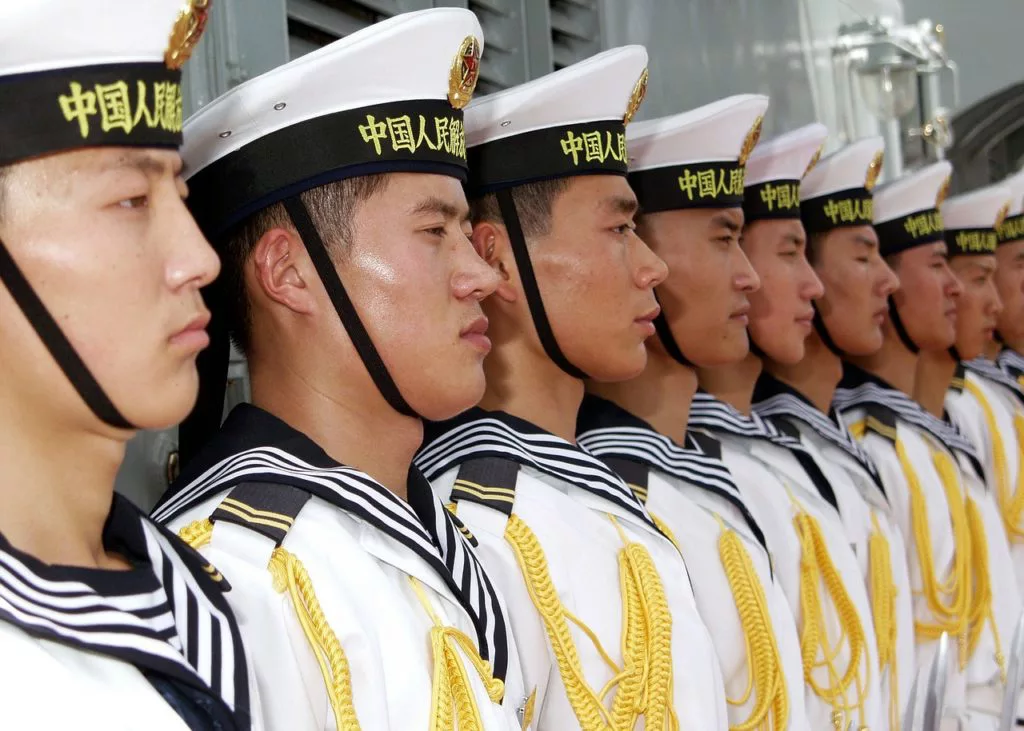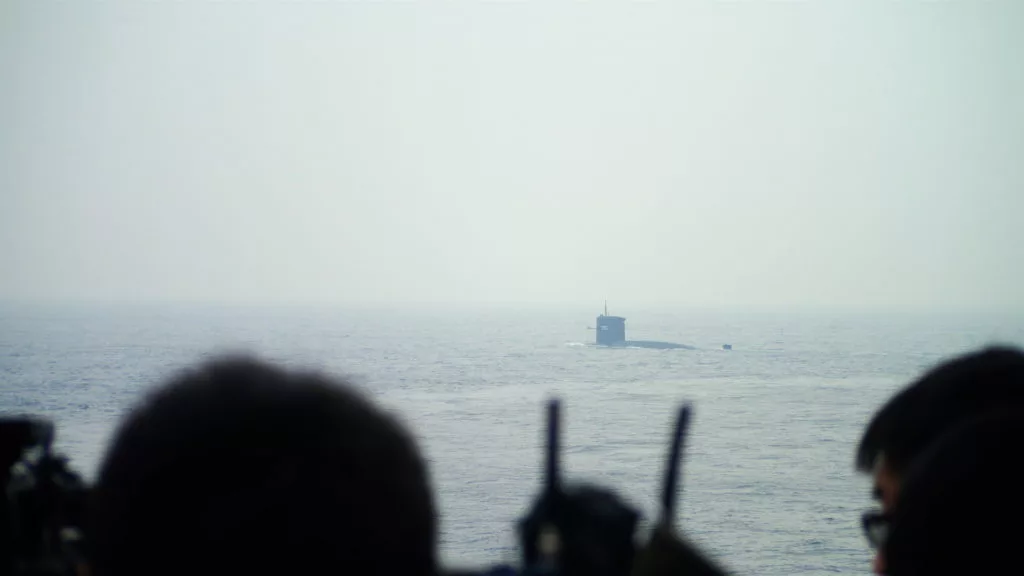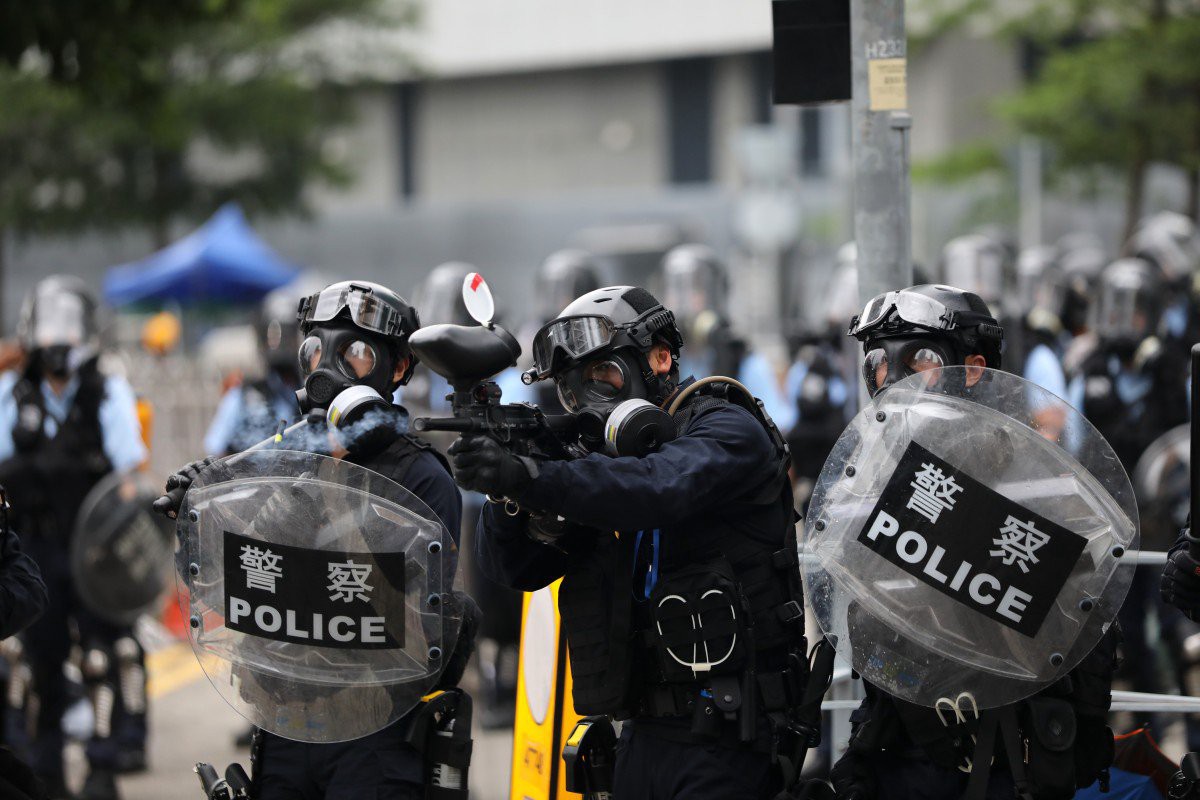A blockade of Taiwan would be Beijing’s most pragmatic and logical military course of action. It is imperative that Taiwan take the necessary measures to defend against that form of coercion.
Chinese military action against Taiwan is often described in terms of a D-Day style amphibious invasion, and a large body of thought and literature regarding Taiwan’s national defense has been concerned with thwarting a Chinese attack of that nature. However, for various reasons it would arguably make more practical sense for China to blockade Taiwan rather than to invade. This analysis examines the factors that lead to that conclusion and what Taiwan can do to better prepare against such a contingency.
Why is China likelier to blockade than invade
A blockade does not need to be militarily effective to be practically effective. This is the most crucial factor working against Taiwan in such a scenario. The mere threat of a blockade could frighten commercial air and sea carriers away from the “no-go zone” altogether. Few, if any, commercial shipping companies or airlines would take the risk of having ships sunk or aircraft shot down by trying to penetrate a Chinese blockade cordon, and equally few if any insurance companies would want to provide coverage for such a risky action.
This means that even a weak, sloppy Chinese blockade could be highly effective, and even a robust, well-executed Taiwanese anti-submarine warfare (ASW)/anti-ship campaign may not suffice to restore trade shipping. Even military intervention by the United States might not make jittery commercial air and sea carriers resume operations in and out of Taiwan, and the mere destruction of one or a few vessels or airliners could render the entire Taiwan region a commercial no-go zone for months. A blockade therefore gives China very efficient return on little effort.
A blockade may be less likely to prompt foreign military intervention. The international community could consider a blockade of Taiwan to be a “milder” form of Chinese military action than an invasion. (In any military scenario, Taiwan must err on the side of caution and assume that there will be no foreign military intervention on its behalf, especially during a Trump presidency. But China, on the other hand, must err on its side of caution and take possible foreign military intervention into account.) Thus, a U.S. military intervention on Taiwan’s behalf in the event of a blockade could be less likely than in the event of a full-out Chinese invasion. A Chinese invasion would also pose a greater threat to life and limb to foreign citizens in Taiwan, another factor making outside military intervention more likely.
A blockade is easier to execute than an invasion. An invasion of Taiwan would be no small undertaking. It would require a formidable amount of amphibious-sealift capability, air-supremacy assets, tactical planning, logistical support, and complex joint-warfare coordination between different branches of the People’s Liberation Army (PLA). In fact, it would be quite possibly the most challenging amphibious invasion ever yet undertaken in human history, with the level of difficulty surpassing that of Operation Overlord (D-Day) in World War II. And China still lacks the requisite number of amphibious-assault platforms and troop ferries needed to carry out a large-scale invasion of this sort.
Terrain favors the blockader when the target being blockaded is an island, especially one as “small” as Taiwan, because an island by its nature is cut off from outside access except by air or water.
A PLA blockade of Taiwan, on the other hand, would be far easier to execute, requiring only a cordon of PLA platforms to threaten air and sea vessels entering or exiting Taiwanese ports. Indeed, it would require no further Chinese acquisition of warfighting platforms beyond the aircraft and ships in the PLA’s current inventory. Moreover, China possesses the largest naval submarine fleet in all of East Asia; a fact of vital import in any blockade.
Terrain favors the blockader when the target being blockaded is an island, especially one as “small” as Taiwan, because an island by its nature is cut off from outside access except by air or water. The onus is therefore on the defender to pierce the blockade. That same terrain, however, works to the advantage of the defender in an invasion, because the onus is then on the invader to ferry forces by air and/or water to reach the island that is to be invaded, and the defenders need only sink a sufficient number of enemy invasion vessels and shoot down a sufficient number of enemy aerial transports in order to render the invasion untenable. The geography of Taiwan, therefore, favors China in a blockade scenario but Taiwan in an invasion scenario.
An invasion of Taiwan could result in heavy Chinese casualties, depending on how many personnel the PLA deployed to Taiwan proper in such an invasion effort, and the loss of a great deal of PLA war material besides. A blockade of Taiwan, on the other hand, would put fewer PLA lives and combatant platforms at risk, many of them possibly located outside the effective range of Taiwanese anti-air and anti-ship systems. China is hardly casualty-averse, but it could only be in Beijing’s interest to lose fewer PLA lives rather than more.

Beijing might not be prepared to sacrifice large numbers of PLAN sailors to invade Taiwan, making blockade a likelier option (photo: Creative Commons)
Invasion or missile bombardment would likely direct Taiwanese ire at China, whereas a blockade is more likely to direct Taiwanese ire at Taiwan’s own government. The nature of a Chinese invasion or missile strike would attribute the harm caused directly to Chinese actions – i.e., Taiwanese civilians killed by PLA missiles, etc., and likely galvanize Taiwanese sentiment against China. A blockade, however, is more likely to generate internal finger-pointing over issues such as shortages of resources, inept Taiwanese government response, et cetera and destroy domestic morale. Blame for resource deprivation might be laid at the feet of the Taiwanese government for failure to respond effectively to the ongoing siege, rather than at the feet of the Chinese government for besieging Taiwan in the first place. And at a certain point, deprivation could lead to domestic pressure for Taiwan to capitulate to China altogether.
To use contemporary American analogies, a Chinese invasion or missile attack on Taiwan could cause a “9/11” type of rally-around-the-flag unifying response in Taiwan, in which support for a government rises in the face of enemy attack, whereas a Chinese blockade of Taiwan could cause a “Hurricane Katrina”-type response, in which support for a government crumbles in the face of domestic bickering.
A blockade would (theoretically) capture Taiwan relatively undamaged. An invasion, on the other hand, would likely inflict considerable damage on Taiwan. Given that China considers Taiwan to be an province to be “reclaimed,” it is in Beijing’s interest to seize Taiwan as intact and undamaged as possible. From China’s perspective, this therefore makes a blockade of Taiwan preferable to an invasion.
Thus, it can be seen that a blockade represents a “best-of-all-worlds” military approach for China: No additional aerial or naval investment required, requires minimal effort, incurs low PLA casualties, generates less international backlash, entails lower risk of failure, and likely inflicts little damage on Taiwan. An invasion, by contrast, represents a “worst-of-all-worlds” military approach for China: Much additional airlift/sealift investment required, requires great effort and precise choreography, incurs high PLA casualties, generates more international backlash, entails higher risk of failure, and likely inflicts significant damage on Taiwan.
Indeed, this is a classic example of accomplishing more by doing less. By undertaking lesser military action – a blockade of Taiwan – Beijing could achieve more optimal results than it would by undertaking greater military action – an invasion. Perhaps the only thing that can be said in favor of an invasion is that it could theoretically capture Taiwan in a shorter timeframe than a blockade, but even that premise is questionable.
Implications and responses
There is considerable overlap in defending against a blockade and defending against an invasion, and many preparatory measures serve as well in countering one as the other. For instance, Taiwan will need a large stockpile of fuel, food, and other supplies in countering a blockade or invasion alike. Low petroleum prices worldwide at the moment make this an ideal time for Taiwan to amass an emergency fuel reserve similar to the United States’ Northeast Gasoline Supply Reserve (NGSR), albeit a stockpile including other vital refined distillates such as diesel and jet fuel, as opposed to gasoline only (as is the case with the NGSR). The immediate need for such distillate products in time of conflict and potential Chinese wartime destruction or sabotage of Taiwanese refineries make it impractical for Taiwan to count on crude oil being refined domestically during wartime.
Taiwan should push forward with the Indigenous Defense Submarine (IDS) program and ASW modernization. Taiwan’s future submarines (if any) will have to be built at home, as the submarine sales approved by the George W. Bush administration in April 2001 never materialized and no other foreign manufacturers will sell such vessels to Taiwan. Submarines are vitally important in defending against a blockade, not only in sinking blockading enemy warships but also in the marauding role of interdicting enemy merchant shipping in their own right. Taiwan’s two Dutch-manufactured Zwaardvis-class submarines, the SS-793 Hai Lung and SS-794 Hai Hu, are already nearing 30 years of service and always constituted an insufficiently-sized submarine force to begin with. Taiwan should press forward with the IDS program to acquire a sufficiently numerous diesel-electric hunter-killer submarine (SSK) fleet in the 2020-2030s.

Better ASW capabilities would go a long way in helping Taiwan increase its ability to counter a blockade (Photo: J. Michael Cole)
Taiwan should also expand its ASW capabilities against China’s submarines at the same time that Taiwan bulks up its own submarine fleet. In addition to the IDS program (it is said that “the best antisubmarine platform is another submarine”), Taiwan will need to better defend its ASW aircraft from enemy antiaircraft assets. And the Republic of China Air Force (ROCAF) will take full delivery of its 12-plane batch of P-3C Orion ASW/maritime-patrol aircraft in July of this year. In the future Taiwan could potentially pursue the Boeing P-8 Poseidon as a replacement for the Orions.
Taiwan must bolster offensive/counter-strike capability. It is important for Taiwan to exert reciprocating pressure on China while under blockade – for instance, using Taiwan’s SSKs to interdict China’s own shipping, having more Taiwanese HF-2E land-attack cruise missiles (LACM) and ballistic missiles capable of striking inland Chinese targets, and so forth. Foreign shipping companies would likely be reluctant to ship in or out of southeastern China within the vicinity of the “Taiwan war zone” while conflict is ongoing, thus also exerting a natural economic pressure of sorts on China by default. However, China’s much greater strategic depth, mainland geography, recent “One Belt One Road” (一帶一路) Central Asia initiative and network of oil and gas land pipelines make it less dependent on maritime shipping and less vulnerable to such coercive action, although such land networks could conceivably be targeted by Taiwanese weapons as well.
The oft-quoted maxim is that “the best defense is a good offense,” and Taiwanese offensive capabilities such as HF-2E, Yun Feng, Wan Chien, etc. could strike the PLA bases from which China’s blockading forces originate and thus hamper a blockade. It is also imperative that Taiwan be able to suppress Chinese antiaircraft systems such as the S-300/-400 and HQ-9 which can threaten aircraft flying over Taiwanese airspace (particularly Taiwan’s west coast) and threaten Taiwanese air cargo operations in the event of China-imposed air/sea lockdown.
Taiwan must become more self-reliant. Alongside of stockpiling a large fuel reserve as mentioned above, Taiwan should expand its capabilities in renewable energy (solar, tidal, wind, biofuel, hydroelectric, and geothermal). The recent push to expand renewable energy’s share to 20 percent of total national electrical output by 2025 is a step in the right direction. This is a rare instance of environmental interests aligning neatly with national defense interests. By reducing dependency on imported fossil fuels, Taiwan would also reduce its vulnerability to enemy blockade. To this end, Taiwan should also do research into exploiting the sizable methane-hydrate resources off of its southwest coast. Taiwan must also reduce its dependency on agricultural imports and become more self-sufficient in food, and draft contingency plans for efficiently rationing supplies in time of crisis.
These measures – making Taiwan more resilient with regards to food, fuel and energy – would not be useful merely as war preparations. They would come in handy in time of earthquake, typhoon, global economic contraction or various other crises. A large strategic fuel reserve has numerous peacetime applications and an expansion in renewable energy would be beneficial for the local and global environment.
When predicting enemy tactics, it is necessary to beware of the fallacy of “mirror imaging,” namely: assuming one’s foe to think and behave the same way oneself would in his shoes.
Taiwan may also need to nationalize domestic commercial air and sea carrier assets in wartime. As mentioned previously, the mere threat of a Chinese blockade could frighten away commercial air and sea shipping from the Taiwan region. This could make it necessary for the Taiwanese government to commandeer commercial air and sea vessels belonging to firms such as Evergreen, in order to have ships and aircraft to contravene a weak blockade with by continuing to run supplies in and out of the island. Taiwan must also diversify its economy to stand more on its own legs and become less dependent on foreign trade as the lifeblood of its economy – the first cord that would be severed by a Chinese blockade. It is impossible for Taiwan to be wholly or even mostly self-reliant, but every little bit helps.
When predicting enemy tactics, it is necessary to beware of the fallacy of “mirror imaging,” namely: assuming one’s foe to think and behave the same way oneself would in his shoes. Thus, the fact that the PLA has made only relatively modest investment in amphibious-assault capabilities to date suggests that a blockade may be precisely the course of action that Beijing has in mind, and that China has little intention of spending resources on an invasion fleet designed to mount a D-Day type invasion of Taiwan. Rather, it may be Beijing’s belief that a blockade can starve Taiwan into submission and that no further investment in amphibious-assault capability is required for the time being.
In most military conflicts, an attacker has the advantage of choice and initiative – being able to choose when, where and in which manner an attack will take place. The situation in the Taiwan Strait is no exception, and Taiwan, the defender, faces the disadvantage in having to defend against all potential avenues of attack that may arise – avenues of which China needs only choose one. But a blockade of Taiwan is Beijing’s most pragmatic and logical military course of action, and it is imperative that Taiwan take the necessary measures to defend against that form of coercion.
You might also like
More from Cross-Strait
Taiwanese Celebrities Who Bow to China: A Tempest in a Teapot
Taiwanese entertainers Ouyang Nana and Angela Chang have sparked controversy in Taiwan over news that they will perform at China’s …
In Memoriam: Lee Teng-Hui and the Democracy That He Built
The former president of Taiwan is the incontestable refutation of the belief that history is merely an impersonal force, that …
The Making of ‘Insidious Power: How China Undermines Global Democracy’
A new book released on July 30 takes a close look at the agencies and mechanisms of CCP 'sharp power' …









